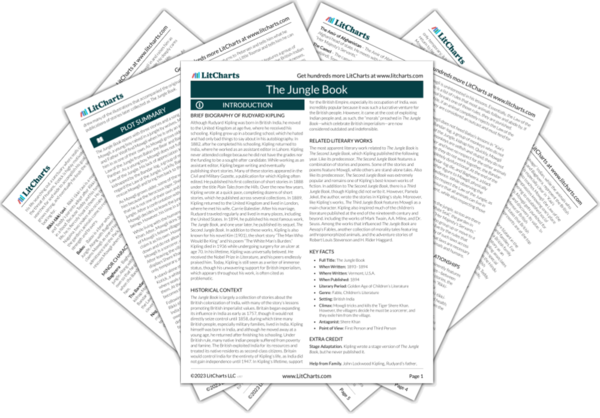Many of the stories in The Jungle Book feature a character’s coming-of-age journey. Mowgli is the most prominent example because he is the main character in several of the book’s stories, each of which mark a different milestone in his maturation process. Mowgli begins his narrative arc as an infant who cannot care for himself or even speak. Over the course of the stories, he grows into a young man who is psychologically complex and has an intimate understanding of his environment. However, Mowgli’s growth does not come easily. At the end of each story, he undergoes a painful but educational experience that helps shape his character. For instance, at the end of “Kaa’s Hunting,” Bagheera physically punishes Mowgli, and only after his punishment is complete does Mowgli learn and appreciate the Law of the Jungle, which becomes the social system he strives to uphold. Similarly, at the end of “Tiger! Tiger!” Mowgli triumphs over Shere Khan only to realize that part of him feels like he does not belong in the jungle. He describes this split in his thinking as becoming two separate Mowglis, and it brings him immense sadness. Nonetheless, it is an experience that drives him into the next chapter of his life (returning to the world of humans).
Other stories in The Jungle Book tell similar coming-of-age stories. In “The White Seal,” Kotick undergoes a fundamental shift in his character and understanding of the world after witnessing a group of men clubbing and skinning his friends. This experience shakes Kotick to his core, and he spends the next chapter of his life searching for a place where seals can be free from human cruelty. Ultimately, The Jungle Book presents a wide variety of coming-of-age experiences, and the results are not uniform. While nature of these events varies, but their magnitude is undeniable, as they significantly alter the course of the individual’s life. The Jungle Book portrays the shift from childhood to adulthood as a process that is only complete after a person (or animal) has undergone a significant event that changes the way they see themselves and the world in which they live.
Coming of Age ThemeTracker

Coming of Age Quotes in The Jungle Book
‘And it is I, Raksha [The Demon], who answers. The man’s cub is mine, Lungri—mine to me! He shall not be killed. He shall live to run with the Pack and to hunt with the Pack; and in the end, look you, hunter of little naked cubs—frog-eater—fish-killer—he shall hunt thee! Now get hence, or by the Sambhur that I killed (I eat no starved cattle), back thou goest to thy mother, burned beast of the jungle, lamer than ever thou camest into the world! Go!’
‘Ay, roar well,’ said Bagheera, under his whiskers, ‘for the time will come when this naked thing will make thee roar to another tune, or I know nothing of man.’
‘But why—but why should any wish to kill me?’ said Mowgli.
‘Look at me,’ said Bagheera. And Mowgli looked at him steadily between the eyes. The big panther turned his head away in half a minute.
‘That is why,’ he said, shifting his paw on the leaves. ‘Not even I can look thee between the eyes, and I was born among men, and I love thee, Little Brother. The others they hate thee because their eyes cannot meet thine; because thou art wise; because thou hast pulled out thorns from their feet—because thou art a man.’
The dawn was beginning to break when Mowgli went down the hillside alone, to meet those mysterious things that are called men.
‘Better he should be bruised from head to foot by me who love him than that he should come to harm through ignorance,” Baloo answered very earnestly. “I am now teaching him the Master Words of the Jungle that shall protect him with the birds and the Snake People, and all that hunt on four feet, except his own pack. He can now claim protection, if he will only remember the words, from all in the jungle. Is not that worth a little beating?’
Bagheera gave him half a dozen love-taps from a panther’s point of view (they would hardly have waked one of his own cubs), but for a seven-year-old boy they amounted to as severe a beating as you could wish to avoid. When it was all over Mowgli sneezed, and picked himself up with a word.
‘Now,’ said Bagheera, ‘jump on my back, Little Brother, and we will go home.’
One of the beauties of Jungle Law is that punishment settles all scores. There is no nagging afterward.
‘Lead us again, O Akela. Lead us again, O Man-cub, for we be sick of this lawlessness, and we would be the Free People once more[,]’ [cried the Pack.]
‘Nay,’ purred Bagheera, ‘that may not be. When ye are full-fed, the madness may come upon you again. Not for nothing are ye called the Free People. Ye fought for freedom, and it is yours. Eat it, O Wolves.’
So Mowgli went away and hunted with the four cubs in the jungle from that day on. But he was not always alone, because years afterward he became a man and married.
But that is a story for grown-ups.
I am two Mowglis, but the hide of Shere Khan is under my feet.
All the Jungle knows that I have killed Shere Khan. Look – look well, O Wolves!
Ahae! My heart is heavy with the things that I do not understand.
The elephants were stamping altogether now, and it sounded like a war-drum beaten at the mouth of a cave. The dew fell from the trees till there was no more left to fall, and the booming went on, and the ground rocked and shivered, and Little Toomai put his hands up to his ears to shut out the sound.











